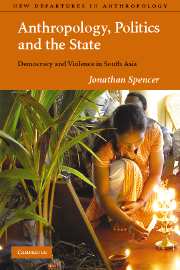Book contents
- Frontmatter
- Contents
- List of illustrations
- Acknowledgements
- 1 The Strange Death of Political Anthropology
- 2 Locating the Political
- 3 Culture, Nation, and Misery
- 4 Performing Democracy
- 5 States and Persons
- 6 The State and Violence
- 7 Pluralism in Theory, Pluralism in Practice
- 8 Politics and Counter-politics
- Bibliography
- Index
3 - Culture, Nation, and Misery
Published online by Cambridge University Press: 05 June 2012
- Frontmatter
- Contents
- List of illustrations
- Acknowledgements
- 1 The Strange Death of Political Anthropology
- 2 Locating the Political
- 3 Culture, Nation, and Misery
- 4 Performing Democracy
- 5 States and Persons
- 6 The State and Violence
- 7 Pluralism in Theory, Pluralism in Practice
- 8 Politics and Counter-politics
- Bibliography
- Index
Summary
Culture and Conversation
We need to press the issue of translation a little harder. In this book I want to combine some of the themes that remained resolutely separated in the discussion in the last chapter. I want to show how the political has come to be constituted in different parts of the postcolonial world, as something unimaginable in its current form without the institutional framework of the postcolonial state, but also as something whose story cannot be simply contained within the known history of that institutional framework. In this chapter I will do this by returning to the paradoxes raised by the cultural interpretation of new, ‘modern’, institutions and practices, suggesting that these institutions and practices never simply carry their own stories immanent within them, but in fact are understood in whatever idiom comes to hand. Political modernity is a diverse modernity, because different people bring different histories, values, and expectations to their encounters with its apparently invariant forms. But the political itself is not a static object mutely awaiting its local interpretation. It is a field of tremendous potential productivity and danger, never less than disturbing, and often seemingly capable of blowing away received expectations in very different areas of life. I will start to elaborate on this sense of the political in the next chapter, but here I want to stay with the issue of the translation of political forms into new settings.
- Type
- Chapter
- Information
- Anthropology, Politics, and the StateDemocracy and Violence in South Asia, pp. 48 - 71Publisher: Cambridge University PressPrint publication year: 2007

